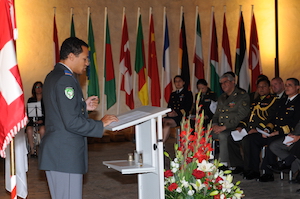The International Committee of Military Medicine, the ICMM Reference Centre for Education of International Humanitarian Law and Ethics, and the Swiss Armed Forces Medical Services Directorate wish to offer to young Military Medical Personnel, Military Medico-Legal Officers, and Chaplains as well as other interested members of the armed forces a course on
Military Medical Ethics in Times of Armed Conflict
General Information on the Ethics Course
 The 5th ICMM Course on Military Medical Ethics in Times of Armed Conflict (Military Medical Ethics/ MME) will take place from 20.-24. August, 2017. As in the previous years, it will be organised by the Medical Services Directorate of the Swiss Armed Forces in Spiez, Switzerland.
The 5th ICMM Course on Military Medical Ethics in Times of Armed Conflict (Military Medical Ethics/ MME) will take place from 20.-24. August, 2017. As in the previous years, it will be organised by the Medical Services Directorate of the Swiss Armed Forces in Spiez, Switzerland.
This advanced course aims at qualifying the participants to make correct decisions in situations where competences in international law and ethics are similarly relevant. The capacity is built and trained by means of case studies which are drawn on situations and reports from recent deployment.
The concrete cases and topics can vary from year to year and will reflect current needs. Cases from the experience of course participants are welcome but should be made in advance to allow for a sound preparation of the analysis.
- If you are interested in participating, please send the registration form or contact
This email address is being protected from spambots. You need JavaScript enabled to view it. fur further questions.
Program


Topics and Subjects of the course. Outline of the Curriculum.
(A) Introductions. Basic part of the course
- The first introductory session to the course will be a shared session of all Spiez courses. Welcome address, lecture "Why we are here" (Introduction to some topics of medical and military medical ethical) and general introduction to the course, organizational arrangement, etc.
- Further sessions are of the course are dedicated to lectures introducing to the several aspects of Military Medical Ethics. The lectures cover the following topics:
- "Refresh Course" LOAC
- Ethics and Law
- The ethically difficult role of the medical personnel in the armed forces
- Philosophy and Applied Ethics: A model for ethical decision making
(B) Main part of the course
- The larger part of the course is dedicated to the analysis of ethical questions and is-sues within the experience of medical personnel in the armed forces. It shall cover a broad range of subjects, which will be introduced and analyzed along four case studies.
- Besides the work on concrete cases, a second focus is put on the methodological formation of the participants. They shall be able, at the end of the course, to conduct and lead a structured ethical analysis of cases as they may occur to them.
(C) Methodological aspects of the training
- During the course, a model of ethical decision making (developed at Zurich University, and adapted to the purposes and needs of the course and military participants) is presented and applied. It helps structuring ethical problems and enables the scholars to lead a discussion of those kind of problems.
- The application of the model is trained several times during the course. In order to offer a formation that is in step with actual practice, role plays and similar pedagogical methods are used. In addition, possible difficulties during the application of the model or shortcomings within its approach are discussed.
- Current international law play an important role in the case analysis, too. It is taken into account during the case presentations as well as during the ethical discussion of the cases. Sound ethical decisions cannot ignore positive law but must consider it adequately.


Course Aims and Target Group
The course is aimed at
- enabling participants to recognize and analyze situations that present ethical and legal dilemmas from contemporary military deployments;
- qualifying the participants to make legally and ethically sound decisions in situations where competences in international law and ethics are similarly relevant.
The course
- establishes connections of the Humanitarian Law with its ethical foundations;
- illustrates the ethically difficult role of the medical officer who plays a role between soldier and physician;
- familiarizes course participants with approaching ethically difficult situations and dilemmas by teaching them a framework for ethical decision making;
- recognizes and analyzes current problems and challenges related to International Humanitarian Law and military medical ethics within the scope of military operations including peace-keeping operations;
- motivates course participants to recognize their responsibility of training and disseminating Humanitarian Law and Ethics.
The course presupposes basic knowledge of the fundamental norms of International Humanitarian Law (Geneva Conventions and Additional Protocols) as the teaching focuses on the ethical analysis. The cases will however be analysed both from the legal and ethical point of view during the course. Teachers will be both experts in IHL and Applied Ethics.
Course Fee (REDUCED IN 2017)
The price of CHF 1180.00 includes
- Accommodation in the hotel, all meals, non-alcoholic beverages for the course duration 19.08.(evening) – 25.08.2017 (morning)
(CHF 1100.00 for the hotel and a course fee: CHF 80.00). - Extensive course documents, cultural events and excursions with transfers are free of charge for participants and will be paid by the Swiss Confederation.
Participants who plan to arrive earlier or to leave later than the official duration of the course are kindly requested to pay the additional costs. Participants are requested to pay the course fee in CHF (cash or credit-cards) on the day of their arrival at the registration desk. Participants shall bear their travelling costs to and from Switzerland.
Teachers of the 2017 course
Ethics teacher
- Dr. Daniel Messelken
- Dr. Bernhard Koch
IHL/ LOAC teacher
- COL Cord von Einem
